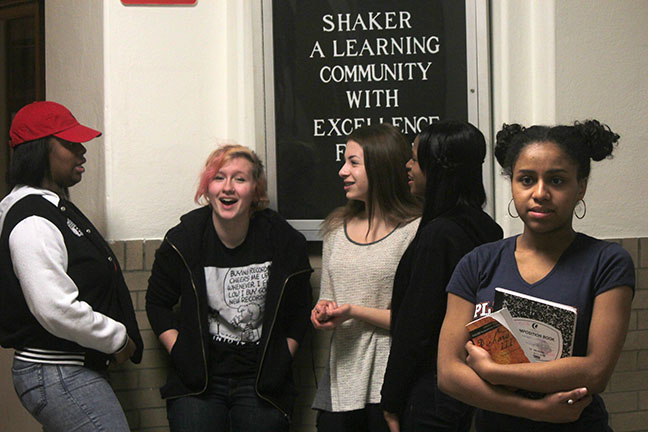School Isn’t Girls’ Problem; It’s Esteem
Confidence issue, gender stereotypes affect class choices, although they shouldn’t
Lisa Damour, director of Laurel School’s Center for Research on Girls, said society has helped shrink girls’ confidence. “When something goes wrong, girls are much more likely to blame themselves,” she said.
In third grade, I made it into the 500s Club in the computer math program we worked on weekly in my class. Along with four boys, I headed down to the principal’s office for a prize.
As we walked there, one of the boys leered in my face. “You’re the only girl,” he sneered, “because girls suck at math.”
Girls suck at math. They suck at science, too. That seems to be the mantra of my life, and I know I share this experience with every other teenage girl.
When walking through the halls, I hear girls constantly degrading themselves, calling themselves “stupid” to make sure no one is intimidated by their smarts. Why do high school girls have such low confidence in academics, or at least pretend they do?
I talked to Lisa Damour, director of Laurel School’s Center for Research on Girls, to answer this question. The Laurel School’s Center for Research on Girls is an organization devoted to incorporating the best available information on how girls learn and grow into Laurel students’ education.
“Girls do this thing where they go from the specific to the global really fast. A girl might not know the answer to one question and instead of saying ‘I don’t understand that question’ she’ll say, ‘Well, I’m bad at math,’” said Damour. “When something goes wrong, girls are much more likely to blame themselves.”
For many girls, society has taught them that they are wholly to blame for their mistakes. Constant apologizing is an automatic response for girls, to the point where I was astounded when I realized how often I was doing it. Boys, on the other hand, will look to other causes for their mistakes besides their own ineptitude.
Damour explained these discrepancies between boys and girls. “Somehow we socialize boys, maybe with sports, that it’s really OK to go out there and beat your best friend and you’re still best friends — it’s not a big deal,” she said. “We don’t set girls up the same way, with this idea that competing with your friends is fun and fine.”
It seems normal for boys to beat each other up, literally, and still be on great terms. When a boy answers incorrectly in class, other boys in the class jokingly make fun of him. Girls don’t compete with each other like that, out of fear that they’ll be branded as “annoying,” or worse, “smart.” (The horror!)
However, teenage girls’ lack of confidence extends farther than just academics. Seven in 10 girls believe they are lacking in terms of appearance, according to dosomething.org, an organization dedicated to “making the world suck less” through campaigns for social change. Those girls are four times more likely to make decisions with boys that they’ll end up regretting later in life, using promiscuity as a means to build confidence. Interestingly, there is a correlation between the way girls view their bodies and how they perform in school.
Both Damour and Kathleen Kash, chairwoman of Case Western Reserve University’s physics department, referenced a study in which girls and boys were both given a math test while seated in front of a mirror — once while wearing a swimsuit and once while wearing clothing in which they felt comfortable. The girls scored poorly on the test they took in swimsuits compared to the test they took in comfortable clothing, while the boys scored the same on both tests.
“When girls are feeling self-conscious about their bodies, it makes them uncomfortable and distracted and actually hurts their academic studies,” Damour said.
So, I now have the added factor of my appearance weighing on my academics. Girls can hardly leave the house without being bombarded by images of freakishly-skinny, computer-modified women, while most male-oriented advertising objectifies women anyway.
Social studies and English teacher Halle Bauer recognized the role of media in girls’ confidence, “I think it’s a problem everywhere. I think that unfortunately gender roles are reinforced by the media and potentially by personal experiences.”
Bauer also saw this confidence issue in her classroom, “Two of my classes use personal journaling as a central assessment, especially my human rights class, and a lot of it is about identity. If they’re not comfortable about their identity sometimes they will write about it and I see it there.”
The gender divide in math and science fields is also striking. In my advanced science class, there are seven girls out of 25 students. My friends who take honors science classes are quick to tell me they “suck” at science.
Though the ratio remains wholly unbalanced, Kash said it is slowly leveling out. Today, women make up 18-20 percent of women in graduate school physics, compared to a measly six percent in Kash’s class in the 1980s.
“Me and science class, we don’t go together,” I remember one friend saying.
But why? Many girls who earn A’s in Advanced Placement humanities classes refuse to believe that they could ever succeed in AP math and science classes.
“We somehow taught that math is one of those things you either get it or you don’t,” said Damour. In reality, however, “everybody gets to a place in math or science where they don’t get it any more and they have to hammer away to understand it.”
“If you have a terrible teacher, or you changed schools and missed something, its tough to catch up,” said Kash. “It takes an understanding of ‘I’m not dumb, I just have to catch up,’ as well as realizing how difficult the subjects are, and lack of understanding is not because they’re not talented, its because it’s truly difficult.”
Girls should take a step back once in a while and consider all of the other reasons they might be doing poorly in a class, other than their core intelligence. Yeah, it’s annoying when high schoolers blame anything but themselves for low academic achievement — however, some girls need to shift the blame off of themselves once in a while.
“I think society has forced girls to think that they aren’t able to do as well in science and math fields and are more apt to doing well in English and history classes, though this isn’t true. It is the way we have been brought up to think,” freshman and advanced science student Krysta Aulak said.
Usually, boys continue pursuing math or science when they reach this point. Girls, however, said Damour, “when they feel uncertain, they make these sweeping indictments of their skills in the entire field.”
“I think girls should take [advanced math and science] classes because we are just as able, if not more able, to be successful in these classes,” Aulak said.
Junior Anna Seballos observed the same problem. Her AP Chemistry class has only five girls, out of 21. “I think it’s really important that girls have confirmed their ability to do math and science. Women should take charge of STEM careers,” she said. “There’s such an imbalance.”
“My friend actually just told me that one of her friends asked her why she was taking advanced classes since she couldn’t handle it, when she really can,” said Aulak. “That’s how some people think.”
Sophomore AP Biology student Rakhsha Khatri believes that “it all depends on how [girls] feel about science . . . If one doesn’t like science at all, still take it because the more different types of classes a student takes, the more experiences one will gain.”
Ally Nordstrom, also a sophomore and AP Biology student, agreed. She said that “I honestly don’t notice that there are fewer girls. But when I do, I guess I think it’s odd.”
Why is it odd that fewer girls take advanced science classes? It seems to be a normal part of life, but “girls are actually outperforming boys,” said Damour. “They’re getting better grades starting in elementary school and going through high school.”
However, she said, “girls don’t know how to do that [outperform boys] without worrying if that is going to be seen as stuck up.”
The humanities are often said to be easier than math and science — this is a leading reason that my friends give for beginning the International Baccalaureate program their junior year.
“I’m just so bad at science, I know I’m never going to pursue a career in it, IB is all about the humanities,” they say. Actually, that’s a common misconception about IB, but that’s a whole other story.
I’m not trying to force any girls into a math and science track, but many girls don’t even consider it. The real problem at the heart of all of this is that often, girls compromise smarts for status — it’s a well-known stereotype that boys don’t like girls who outsmart them. I dumb myself down all the time, without even intending to: purposely stumbling over a phrase in French, not answering a question when I really do know the answer, and so forth. This kind of behavior is ingrained in my mind. Reporting and writing this article has opened my eyes to girls’ silent code when it comes to academics. But what about at all-girls’ schools, where there isn’t the added stress of appearing dumber to impress boys?
“Being at an all-girls’ school, the social and academic environment has a blatant difference than in a co-ed school,” said sophomore Emmi Bowles, who has been attending Beaumont, an all-girls’ Catholic high school, for the past two years. “At Beaumont, girls become independent . . . Our self-esteem is decreased through drama, of course, but I believe it is leveled out when the anxiety of encountering the opposite sex does not exist.”
Nordstrom believes that problem should change at all schools. “I think there should be as many girls in advanced classes in general as guys,” she said.
Seballos agreed. “It’s not an anomaly if a girl is good at science,” she said.
Kash believes that schools should “aim to get girls excited about science when they’re really young, and try to combat any barriers preventing them from staying interested.”
Often, girls growing up in Shaker Heights have heard from teachers and family members that they can do anything boys can do (except break the record for fastest mile ever run by a human being, lift the heaviest weights ever lifted — you get the picture). That may sound like a cliche, but many girls don’t live by it.






